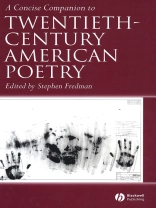This Concise Companion gives readers a rich sense of how the
poetry produced in the United States during the twentieth century
is connected to the country’s intellectual life more broadly.
* Helps readers to fully appreciate the poetry of the period by
tracing its historical and cultural contexts.
* Written by prominent specialists in the field.
* Places the poetry of the period within contexts such as: war;
feminism and the female poet; poetries of immigration and
migration; communism and anti-communism; philosophy and
theory.
* Each chapter ranges across the entire century, comparing poets
from one part of the century to those of another.
* New syntheses make the volume of interest to scholars as well
as students and general readers.
สารบัญ
Notes on Contributors viii
Acknowledgments xi
Chronology xii
Introduction 1
Stephen Fredman
1 Wars I Have Seen 11
Peter Nicholls
American poets’ response to war, with particular attention to Ezra Pound, Gertrude Stein, Allen Ginsberg, Robert Duncan, George Oppen, Susan Howe, and Lyn Hejinian.
2 Pleasure at Home: How Twentieth-century American Poets Read the British 33
David Herd
How US poets responded and reacted to British poetry, in particular, Romanticism, focusing on Robert Frost, Ezra Pound, T. S. Eliot, William Carlos Williams, Wallace Stevens, Marianne Moore, Cleanth Brooks, Charles Olson, Frank O’Hara, and Adrienne Rich.
3 American Poet-teachers and the Academy 55
Alan Golding
Discusses the relationship between poets and the academy, with attention to Ezra Pound, the Fugitives,
Charles Olson, the anthology wars, creative writing programs, African-American poetry, Charles Bernstein,
and Language poetry.
4 Feminism and the Female Poet 75
Lynn Keller and Cristanne Miller
Twentieth-century poetry developed in the context of evolving feminist thought and activism, as demonstrated in the work of Marianne Moore, Gertrude Stein, H. D., Muriel Rukeyser, Gwendolyn Brooks, Sylvia Plath, Adrienne Rich, Sonia Sanchez, and Harryette Mullen.
5 Queer Cities 95
Maria Damon
The relationship between gay urban sensibility and poetic form, with discussions of Gertrude Stein, Djuna
Barnes, Hart Crane, Frank O’Hara, Robert Duncan, Jack Spicer, and Allen Ginsberg.
6 Twentieth-century Poetry and the New York Art World 113
Brian M. Reed
Poetic responses to New York’s avant-garde tradition in the visual arts, with attention to Mina Loy, William
Carlos Williams, Frank O’Hara, John Cage, John Ashbery, Jackson Mac Low, and Susan Howe.
7 The Blue Century: Brief Notes on Twentieth-century African-American Poetry 135
Rowan Ricardo Phillips
Discusses the effect that the blues and jazz have had on twentieth-century African-American poets, including Paul Dunbar, Langston Hughes, Sterling Brown, Robert Hayden, Gayl Jones, Yusef Komunyakaa, and Michael Harper.
8 Home and Away: US Poetries of Immigration and Migrancy 151
A. Robert Lee
The ongoing arrival of populations from beyond US borders and internal migration, as reflected in
poetry – WASP to African American, Jewish to Latino/a, Euro-American to Native American.
9 Modern Poetry and Anticommunism 173
Alan Filreis
A survey of the complex association of modern poetry and American communism (and anticommunism),
including discussions of Muriel Rukeyser, William Carlos Williams, Genevieve Taggard, Wallace Stevens, and Kenneth Fearing.
10 Mysticism: Neo-paganism, Buddhism, and Christianity 191
Stephen Fredman
Why mysticism appeals to American poets and how it affects their poetry, focusing upon Ezra Pound, H. D., T. S. Eliot, Robert Duncan, Charles Olson, John Cage, Gary Snyder, Allen Ginsberg, Denise Levertov, and Fanny Howe.
11 Poets and Scientists 212
Peter Middleton
Shows how poets, including William Carlos Williams, Hart Crane, Wallace Stevens, Robert Creeley, Charles
Olson, Ron Silliman, Myung Mi Kim, and Mei-mei Berssenbrugge have responded to modern technology and the new sciences of physics and genetics.
12 Philosophy and Theory in US Modern Poetry 231
Michael Davidson
Addresses the role of ideas and theory in modern poetry, with examples drawn from Wallace Stevens,
Ezra Pound, T. S. Eliot, William Carlos Williams, Gertrude Stein, the New Critics, and many others.
Index 252
เกี่ยวกับผู้แต่ง
Stephen Fredman is Professor of English and Department Chair at the University of Notre Dame. He is the author of three books of criticism; Poet’s Prose: The Crisis in American Verse (1983), The Grounding of American Poetry: Charles Olson and the Emersonian Tradition (1993), and A Menorah for Athena: Charles Reznikoff and the Jewish Dilemmas of Objectivist Poetry (2001). He has translated three books from Spanish and is also the author of Seaslug, a book of poetry.












